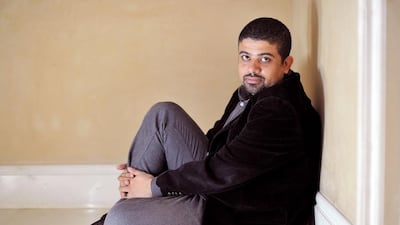Ahmad Abdalla is proving to be a filmmaker increasingly difficult to pigeonhole. Following his first two, hugely well-received feature films, Heliopolis and Microphone, it looked like the young Egyptian was a storyteller-slash-documentary man possessing a deeply satirical streak – and with one foot in his country's vibrant underground scene.
But then came last year's Rags &Tatters, a far quieter, almost experimental drama that cleverly flittered around the edges of the 2011 Egyptian revolution without diving into its turbulent heart. His latest production, however, takes him on an even wider tangent.
Decor, based on a script by Mohamed Diab (who directed the drama 678, a Dubai International Film Festival 2010 hit alongside Abdalla's Microphone), is a psychological drama set in Cairo.
"It's about a woman struggling to know what she wants, and struggling to have her own choices in life," says Abdalla, speaking in Dublin at the first Dublin Arabic Film Festival, where Rags &Tatters was given a special screening. "I would consider it more classic than any film I've done before, an homage to old Egyptian cinema, to Faten Hamama and Omar Sharif. The main character is obsessed with old Egyptian films, which she keeps playing on VHS."
In keeping with the classic theme, the entire film is played out in black and white, the first Egyptian film to use this format since Mohamed Fadel's 1996 drama Nasser 56, about the late Egyptian president Gamal Abdel Nasser.
But despite the aesthetic and genre differences, the major shift for Abdalla was the actual filmmaking itself, with Decor marking the director’s first foray away from independent cinema, having been brought on by the local commercial production house New Century.
“It meant I was working with a big budget for the first time in my life,” he says, admitting that he was sometimes a little scared by the numbers, rumoured to be as much as US$800,000 (Dh2.9 million).
“The first time I was hearing figures, just on basic things such as the camera or the lighting, it was already 10 times what I used to have. So, in the end, I just decided not to know and asked them not to tell me. But everything I wanted was there. If one day I wanted some very expensive, sophisticated equipment, they would bring it. I wanted to have a dream sequence, so we needed big, computer-generated scenes, which are very expensive, and they did it.”
With big budgets come big production teams and big responsibilities, another stark difference to Abdalla’s previous shooting methods.
"On Microphone, for example, I was used to working with about seven or eight people on set – that was my crew. But for this one, some days we had over 100 people behind the camera," he says, adding that everything had to be planned to the minute.
"With Rags & Tatters or Microphone, for me it was easy. 'Are we going to film today, are we not going to film today? Let's try tomorrow.' Nobody was worried as it wasn't very expensive. But with this project, it wasn't anywhere as laid back. Every single hour is costing a lot of money, so I had to make sure it was very tight, as I couldn't afford to lose any time on the talent or my crew."
In choosing Abdalla to take the reins of Decor, New Century had picked arguably the most exciting director working in Egypt today.
But despite Abdalla’s recent rise to deserved prominence, his country’s past few turbulent years have made for uncertain times for its film industry, with the outpouring of creative expression that emerged from the 2011 revolution marred by fears regarding censorship and interference from the changing powers.
For Abdalla, the most troubling concern is the public’s growing distrust of filmmakers.
“People are becoming very camera-phobic, they’re now very scared when they see a camera in the street,” he says, laying the blame on the local media for pushing conspiracy theories regarding foreigners filming in Egypt. “The first thing you hear when you take out your camera now is ‘Are you from Al Jazeera?’ It’s crazy.”
When shooting scenes for Microphone in Alexandria in 2010, Abdalla says local residents were hugely supportive, regularly coming out to watch the filming from their homes.
But upon returning to Egypt recently for a documentary project, Abdalla says the second he emerged from the production bus with his equipment, he was greeted with hostility.
“They were very violent, pushing us and telling us to go back to Cairo, shouting ‘We don’t want you’ and ‘You’re from Al Jazeera’. This is what I’m scared about the most in the current situation.”
Whatever the future holds for filmmakers in Egypt, it won’t deter Abdalla, who says he’ll probably change tack again for his next production, going from unlimited finances back to his old low-budget stamping grounds.
“I think I’d like to go even more independent than before, back to very small crews – just three or four – and using unknown actors. I’d like to try this one more time.”
With Decor likely to see more major production houses knocking on his door, it could well be Abdalla's last chance to keep things low key for some time.
artslife@thenational.ae

